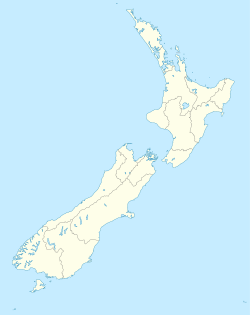Karamea
| Karamea | ||
| Geographical location | ||
|
|
||
| Coordinates | 41 ° 15 ′ S , 172 ° 7 ′ E | |
| Region ISO | NZ-WTC | |
| Country |
|
|
| region | West coast | |
| District | Buller District | |
| Ward | Seddon Ward | |
| Residents | 375 (2013) | |
| height | 6 m | |
| Post Code | 7893 | |
| Telephone code | +64 (0) 3 | |
| website | www.karamea.org.nz | |
| Photography of the place | ||
 Main street in Karamea |
||
Karamea is a small town in the Buller District in the West Coast regionon the South Island of New Zealand .
Origin of name
The name Karamea comes from the Māori language and is said to mean either “red ocher ” or a corruption of Kakarataramea , “smell of spear grass leaves”.
geography
The place is the northernmost settlement in the West Coast region and is 96 kilometers by road northeast of Westport . From there, the only connection to the city is via an extension of State Highway 67 . The road stretches a few kilometers northwards via Caldervale to end at the Kohaihai River not far from the west end of the Heaphy Track .
The Karamea River passes the city in the south and flows into the Karamea Bight , a bay of the Tasman Sea that extends from Cape Foulwind about 100 km to the north . The river forms at its mouth a large lagoon at low tide dry falls .
The Oparara River flows into the Tasman Sea north of the village.
history
The Māori seem to have only visited the area temporarily. The first Europeans and Chinese were gold diggers in the 1860s. The first settlement took place in 1874; At that time, the harbor, which was still good at that time, was the only connection with the outside world. This first settlement was on South Terrace , but poor soil forced the residents to move down into the river valley. Agriculture soon became an important economic factor, along with logging, flax processing and gold mining. The Murchison earthquake of 1929 led to the silting up of the port and also cut off road links to the town for two years.
population
In the 2013 census, the town had 375 inhabitants, 11.3% less than in the 2006 census.
economy
Today dairy farming is an important branch of the economy, plus sphagnum extraction , fishing, furniture production, the cultivation of tomatoes and tamarillos and a tree nursery. Only a quarter of the workforce is employed in the service sector.
Karamea serves as a local service center with a general store, supermarket, gas station, information center, cafe, hotel, campsite, motels and a handicraft shop.
Education
The Karamea Area School is a coeducational composite school for grades 1 to 13 with a Decile rating of 5. The school has fewer than 100 students.
Attractions
The Oparara Basin Arches , large naturally formed river tunnels, are a tourist attraction. However, tourism in the region is less developed in relation to other New Zealand regions.
Web links
- Homepage . Karamea Community,accessed June 21, 2017.
Individual evidence
- ↑ a b 2013 Census QuickStats about a place : Karamea . Statistics New Zealand , accessed July 16, 2016 .
- ↑ a b c Topo250 maps - West Coast - Greymouth and Tasman Mountain - Cape Farewell . Land Information New Zealand , accessed March 1, 2017 .
- ^ Karamea Area School . Karamea Community , accessed June 21, 2017 .

